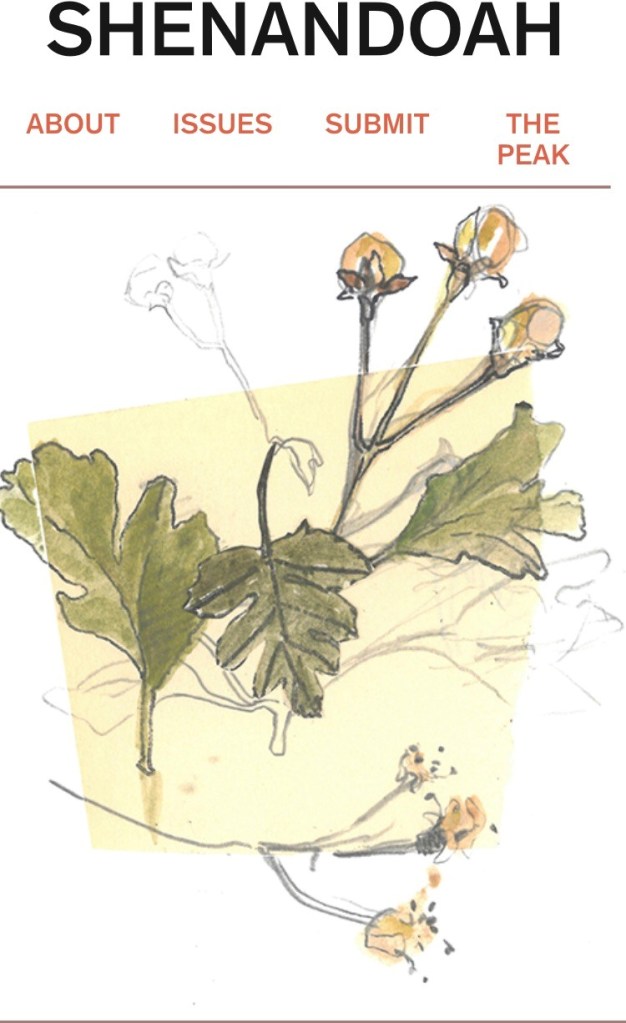The Slightly-Later-Than-Spring 2021 issue of Shenandoah is live! I curated a themed section called “A Grimoire: Poems in Pursuit of Transformation.” My editorial note describes what I mean by “uncanny activism,” but in short, these are poems that try to make things happen, often by using the features of spells, prayers, charms, and other petitions to the more-than-human world. I describe how I see the poems speaking to the portfolio’s theme, but below I also provide lists and links for how these poems might fit onto syllabi for various literature and creative writing courses. Free online content can be a pretty useful way to add richness to a reading list, and of course I think these poems are amazing.
Forms and modes:
- Abecedarian: Chloe Martinez, “Motherhood, a Map”
- Elegy: Luke Munson, “Peire Vidal” & Ann Fisher-Wirth, “Persimmons” & Luisa Caycedo-Kimura, “Drought” & Yun Wei, “It Was Our First Great Sorrow”
- Epistolary poem: Nadia Alexis, “Letter to My Friend Robert”
- Found poem: Chloe Martinez, “Study Finds”
- Persona poem: Ariana Benson, “Dear Moses Grandy…Love, the Great Dismal Swamp (1930)”
- Procedural poem (n-gram generator): Anna Lena Phillips Bell, “Ovivid”
- Prose poetry: Carolyn Oliver, “Do Not Fail to Yield”
- Sonnets: Lisa Russ Spaar, “Of Mistletoe” & “Of Wilde Marjerome”
Ecopoetry:
- Ariana Benson, “Dear Moses Grandy…Love, the Great Dismal Swamp (1930)”
- Erika Meitner, “Assembled Audience”
- Luisa Caycedo-Kimura, “Cultivo”
- Yun Wei, “It Was Our First Great Sorrow”
- Lisa Russ Spaar, “Of Mistletoe” & “Of Wilde Marjerome”
- Anna Lena Phillips Bell, “Ovivid”
Social justice and generally surviving a world than can be awful:
- Ariana Benson, “Dear Moses Grandy…Love, the Great Dismal Swamp (1930)”
- Nadia Alexis, “Cantaloupe”
- Carolyn Oliver, “Questions About Bisexuals #4” (obliquely, but I think so)
- Sam Herschel Wein: “Bock Rottom” (a poem about mental health that’s really funny!)
Poems engaging religion and spirituality (well, more directly than the others):
- With a Donne reference!: Heid E. Erdrich, “Faith and Less”
- With mandalas!: Chloe Martinez, “Mandala of the Pile of Papers on the Dining Room Table”
- With a menorah!: Erika Meitner, “Jesus is the Reason”
- You could categorize this one under “occult” or “skepticism,” maybe: Jeannine Hall Gailey, “Divination”
I hope this list might be helpful to teachers, although I think putting poetry into thematic categories involves some sleight-of-hand. Poems transcend labels like “ecopoetry” and “about religion,” if they’re good. Yet academic study, at least as constituted here and now, depends on categories, due to the sheer necessity of narrowing down some fraction of the literary universe into non-insane portion sizes for courses. Curricula typically divide material by the author’s country of origin, century of publication, literary school, gender, sexuality, race, religion, or other identity category; genre and theme play in, too. None of these categories is “natural.” We’re just used to them. Further, no reading list is fully coherent; every one generates borderline cases. I’d be interested to hear if you think I got any of these categories wrong for these particular poems.
I’m focusing here on the portion of the issue I edited, but I proofread the entire publication (even while on leave, because I love the magazine). I can testify that there’s terrific work all through it. The comics Rachel Cruz curated about survival are very powerful; check out the special translation section on Arabic poetry; BIPOC Editorial Fellow DW McKinney presents nonfiction about home and belonging (Sara Marchant’s “Haunted,” for example, is a memorably weird ghost story). Please check out the regular fiction and nonfiction, too. Beth Staples and her partner-in-crime Morgan Davis choose riveting pieces full of strong feeling that are also often experimental in structure and voice.
Every issue is a huge collective effort brought to wonderful fruition, and it means a lot when other people read it. When any issue of any magazine delights you, let the editors know! Or share it on social media, or do whatever you do to celebrate art you like. The world needs more of that.
In the meantime, I’m revising some pieces, submitting a bit, and preparing for the literary work and logistics of attending the Sewanee Writers Workshop next week–as a student instead of a syllabus-writer, which is delightful. I’m also planning for fall teaching with the kind of open-mindedness sabbaticals can generate, because they detach you for a while from the habits that help you survive an intense job. Toward the process, I’m reading Felicia Rose Chavez’s The Anti-Racist Writing Workshop. It’s full of useful, specific ideas that are smart extensions and articulations of good classroom values: anti-racist pedagogy is here a way of being pro-empowerment for students of many identities who would benefit from thoughtful support. Sewanee is kicking off with an “Ethics of the Workshop” session, too. I’m excited to learn from these conversations, meet actual (masked) human beings, and just sink into the writing life for a while, although September’s mountains loom in the distance.

2 responses to “Teaching guide for “A Grimoire” in Shenandoah 70.2”
Wow, this is terrific–the reference/cross-referencing is helpful. And I’m still rattled after reading “It Was Our First Great Sorrow.”
LikeLiked by 2 people
Thanks so much for reading, Ann!
LikeLiked by 1 person